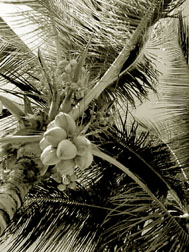|
observer |
|
|
|
|
|
OTHER LINKS |

|

|

|
Searching for alternative energy? Nuts have the answerHONIARA, Solomon Islands - Palm trees conjure an enduring image of the South Pacific, providing shade on a white sandy beach as the water gently laps the shore garnished with coconuts for cocktails and small brightly coloured paper umbrellas.
Electricity companies in Vanuatu, Fiji and Samoa are testing blends of coconut oil and diesel to run power generators. A report by the 20-member South Pacific Applied Geoscience Commission (SOPAC) has found that if Pacific island countries were to replace 50 per cent of diesel imports with coconut oil then the region's average import bill would be cut by 10 percent. Papua New Guinea, Fiji, the Solomon Islands, Samoa, Vanuatu, the Federated States of Micronesia, Tonga, Kiribati, the Marshall Islands, the Cook Islands and Palau spend more than $800 million a year on fuel imports, SOPAC says. In half of those countries fuel imports account for more than a quarter of total imports. "Given the expected continuing rise in fuel prices and the increasing demand for energy supplies, without any indigenous fuel substitutes, Pacific Island countries' balance of payments can be expected to further deteriorate," the SOPAC report says. Creative solutionsCoconut oil extracted from copra, or coconut meat can be used to make biodiesel to directly substitute diesel, or be blended with diesel. SOPAC said engines only need to be adapted for diesel blends of more than 10 per cent coconut oil. Biodiesel is made by enhancing the chemical composition of vegetable, seed or animal fats and oils. The process known as transesterification, removes glycerol from the oil or fat and replaces it with an alcohol. In the troubled Solomon Islands, which relies on aid for 70 percent of its budget and has a population of 500,000, fuel for electricity and transport makes-up one-third of imports, Finance Minister Peter Boyers told Reuters in an interview. Boyers says the Solomons must explore "creative solutions" to ease external pressures on a struggling economy. One such solution is a plan by the Australian Biodiesel Group to produce biodiesel using coconut oil that was last month approved by the Solomons Foreign Investment Review Board. "We're hoping that industry can come in and consume the copra production ... they would produce all that into biofuel, which would be an import subsidization against fuel," Boyers says. "But most importantly it will stabilize the rural man's income by having a base line price per kilo (for copra). That's very important because that affects 80 percent of the population, which is involved in our rural informal sector." |
 But many impoverished Pacific Island nations are also looking to
coconuts to combat soaring world oil prices and cut severe balance of
payment deficits by using coconut oil to make biofuel.
But many impoverished Pacific Island nations are also looking to
coconuts to combat soaring world oil prices and cut severe balance of
payment deficits by using coconut oil to make biofuel. 






